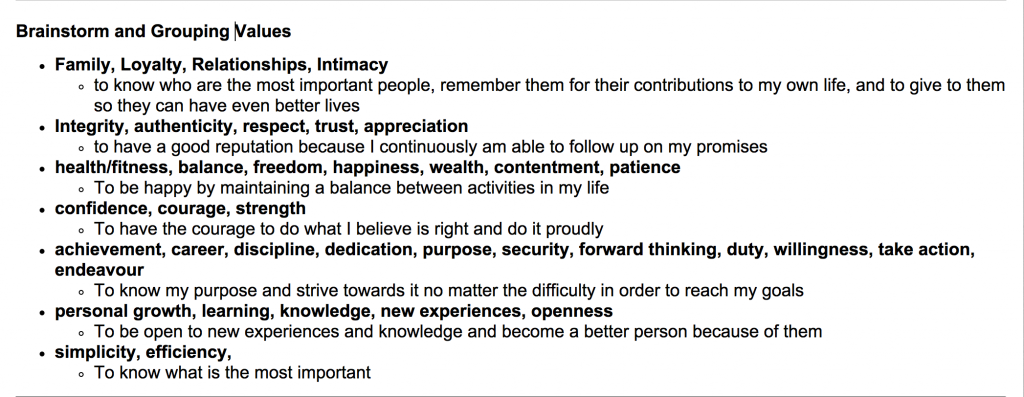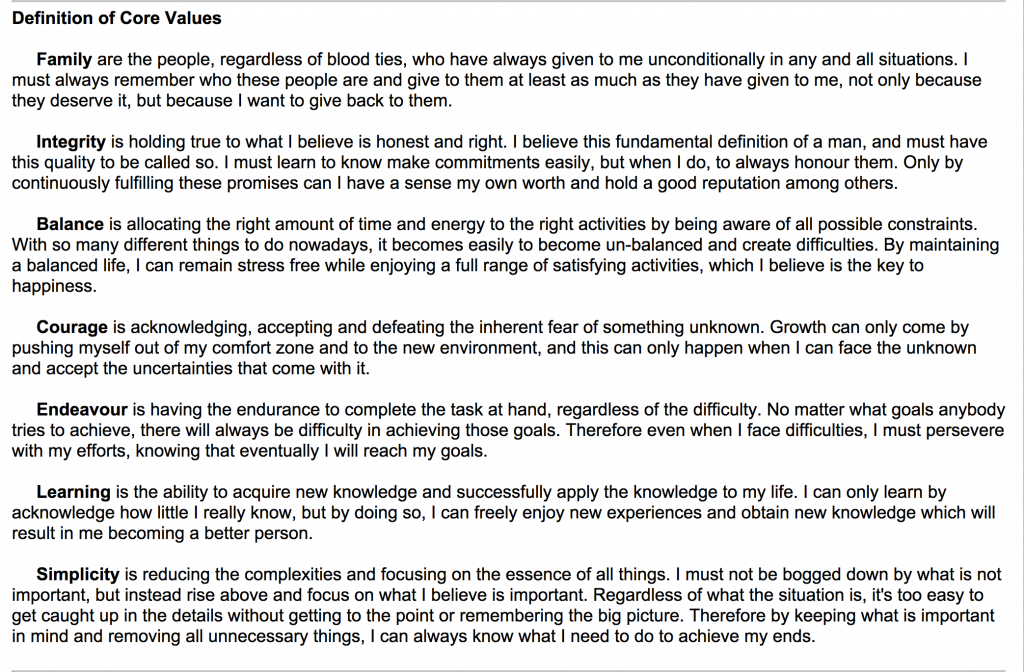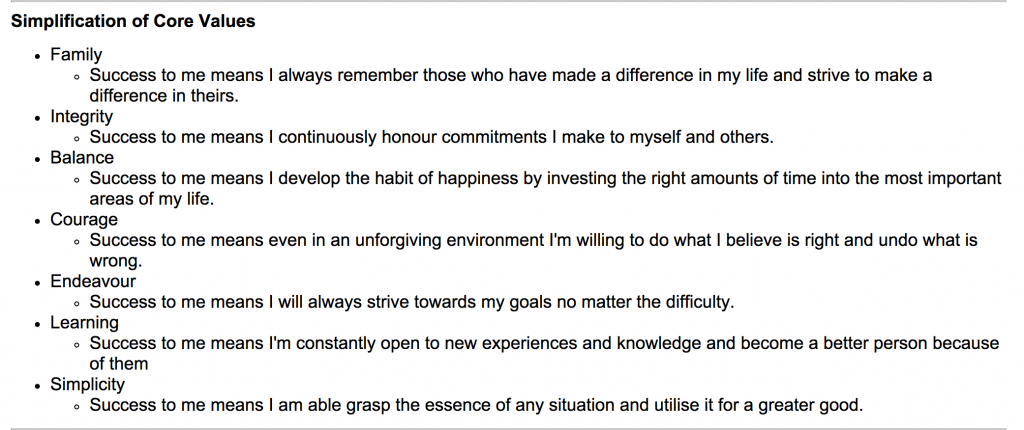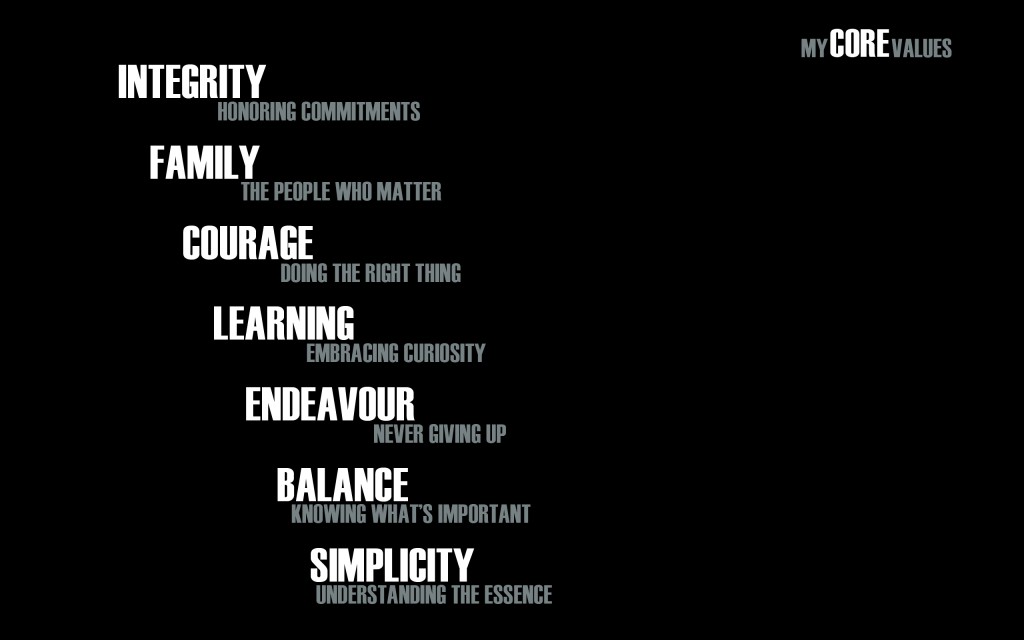Remember when you were a kid and ate that last brownie even though your mom told you not to? At first, it was delicious and let’s be honest, there’s nothing like that happy feeling of having chocolate smeared across your face. But somehow you knew it was wrong and started to feel strangely guilty about it. What happened?
In the last article, we discussed “we are what we know and what we repeatedly do,” but like the 5 year old version of ourselves, sometimes even though we know the right information, it doesn’t necessarily mean we follow through with the right actions. After all, there isn’t a smoker out there who doesn’t know smoking is bad for him. The truth is, we need a way to translate what we know into what we do, and by knowing our core values, and we can make those right decisions.
What Are Core Values?
Let’s define exactly what core values are. “Core” is like essence, something that represents or embodies the whole (of an object), while “values” are principles or standards of behavior. Therefore, our personal core values are the essential but unique set of principles or standards that guide our individual behavior. These values, although different for every person, are innately born to us regardless of whether we recognize them or not because as seen above when you ate the brownie, you felt guilty after doing something wrong.
Why Core Values?
But why bother with core values at all? Life is so much easier without having to think about the implications of every little decision we make. However, though ignoring your core values may make life easier in the short term, this can create huge long-standing consequences. The easiest way to describe these consequences is by illustrating what happens when we don’t know our core values and so don’t live by them.
Today’s society is rife with huge pressures, whether it’s getting good grades, getting a good job or just pleasing our friends or family. With all these pressures, it’s so easy to conform to the pressures and live life the way society wants us to. Many of us find ourselves walking down a path of conformity because we unconsciously make small decisions that agree with life’s pressures. After all, there isn’t a “turning point” on the path of conformity.
Nonetheless, there are always consequences for doing the easy thing, and because we’re on a path that doesn’t align with our core values or what we truly believe in, we could feel long-term stress, disappointment with our lives and a loss of purpose. Most importantly, somehow we’ll just feel something isn’t right, but not know how to fix it.
Obviously, we don’t want to live this life. When we find ourselves walking on a path of conformity but don’t want to be in it, we are experiencing something called dissonance, which means the distress felt when holding two conflicting concepts that can’t be reconciled. In this case, the two conflicting concepts are how we want to live (what we know) and how we actually live (what we do), which cause us to be unhappy. Therefore the value of knowing our core values lies in connecting what we know and what we do by using the correct knowledge to make the right decisions. Since our core values represent who we are, using our core values as a checklist for making decisions can help us prevent future dissonance from occurring. Instead, they can help us be the person we want to be.
Finding Your Personal Core Values
Now that you know how important your own core values are, it’s time to identify your own through six simple steps. Although finding our core values won’t be an “easy solution” to knowing who we want to be, it represents the first step in the right direction.
1) Brainstorm
First, make a list of as many values that relate to you as you can. The easiest thing to do is to use a list of values (http://corevalueslist.com), and pick out the ones you feel like represent yourself, even if it only represents a fraction of who you are. The idea of this first step is to capture as much of yourself as you can.
2) Grouping
Now, after picking out your values, (you should have at least 20), find similarities between the values and group them together. For example, if you wrote down courage and strength, you could group them together because they have similar attributes. Personally, I wouldn’t go over seven groups because too many values can lead to overlap and loss of importance for each individual value. Finally, to really understand why these values attract you, write a sentence for each group that describes the similarities between each value to better understand the values as a group. I’ve attached my own example below to show how you can effectively brainstorm and group your own values. Don’t be afraid to steal a couple of values!
3) Identify
Within your groups, you should now pick out one value that best represents the group and yourself. This is the one of the toughest part of the process, so simplify it for yourself by asking yourself which values you would not be willing to live with.
4) Define
Now with your 5-7 values, define each one by writing out why it is important to you and what success would look like for each value compared to where you are now. Write about it as much as possible because you’ll gain a deeper understanding of your values and know better how to work towards it. Who knows, by writing in-depth about your core values, you might even uncover an underlying core value! If you need some help defining your own values, you can see how I did it. Don’t worry if you can’t think of the definition perfectly; just write down as much as you can first.
5) Simplify
With full definitions, the next step is to shorten each paragraph to one sentence. By shortening the definitions, you force yourself to capture what you really want out of the values, and come up with a “creed of life” based on your core values. As you can see below, I’ve shorten each of my definitions down to one sentence after getting a full definition out previously.
6) Hierarchy
Finally, there are times where your values might be in conflict. For example if family and integrity were two of your core values, but integrity to a family member involved hurting them, which would you choose? Therefore, it’s very useful to define exactly what order your values come in to make sure you can keep your decisions and actions consistent. Personally, I made my core values my desktop background as well to remind myself of them every day.
I hope I’ve managed to show you the importance to knowing our personal core values, and how you can find your own values too. In case you find your life is very different from your core values, guess what? It’s completely natural. At some point in life, most of us realize there’s something wrong, and that’s exactly why we do this exercise. Therefore the most important thing is take action, not only by finding your own core values, but also by living them out. Now get cracking, find your values!








